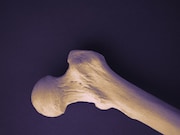Non-Caucasian minorities less likely to receive proper supplementation
FRIDAY, March 15, 2019 (HealthDay News) — Of patients diagnosed with osteoporosis who have a history of hip fracture, only 14 percent are receiving appropriate calcium and vitamin D supplementation, according to a study presented at the annual meeting of the American Academy of Orthopaedic Surgeons, held from March 12 to 16 in Las Vegas.
Evan D. Nigh, of the University of Miami/Jackson Memorial Medical Center, and colleagues analyzed six years of data from the National Health and Nutrition Examination Survey (NHANES) to identify 1,065 patients who self-reported an osteoporosis diagnosis (87 percent female; mean age, 67 years). The authors evaluated dietary questionnaire and examination data for adequate calcium and vitamin D supplement intake, femoral neck bone mineral density, and a history of hip fracture.
The researchers found that 861 patients (80.8 percent) with osteoporosis were not receiving enough calcium and vitamin D supplementation (at least 1,000 mg of calcium and 600 international units of vitamin D). No significant link was seen between a history of hip fracture and appropriate treatment (OR, 0.685). In a subset analysis, 14 percent of patients were receiving enough calcium and vitamin D supplementation; only 26 percent of patients were taking adequate calcium and 32 percent were getting enough vitamin D. Factors linked to an increased likelihood of appropriate supplementation were female sex (OR, 2.354), older age (OR, 1.019), Caucasian race (OR, 1.456), and an osteoporosis diagnosis (OR, 1.651).
“While osteoporotic individuals are receiving calcium and vitamin D supplements at a higher rate than individuals without osteoporosis, our analysis of the NHANES database indicates that the majority of patients with osteoporosis are not receiving adequate therapeutic supplementation,” the authors write.
Copyright © 2019 HealthDay. All rights reserved.








